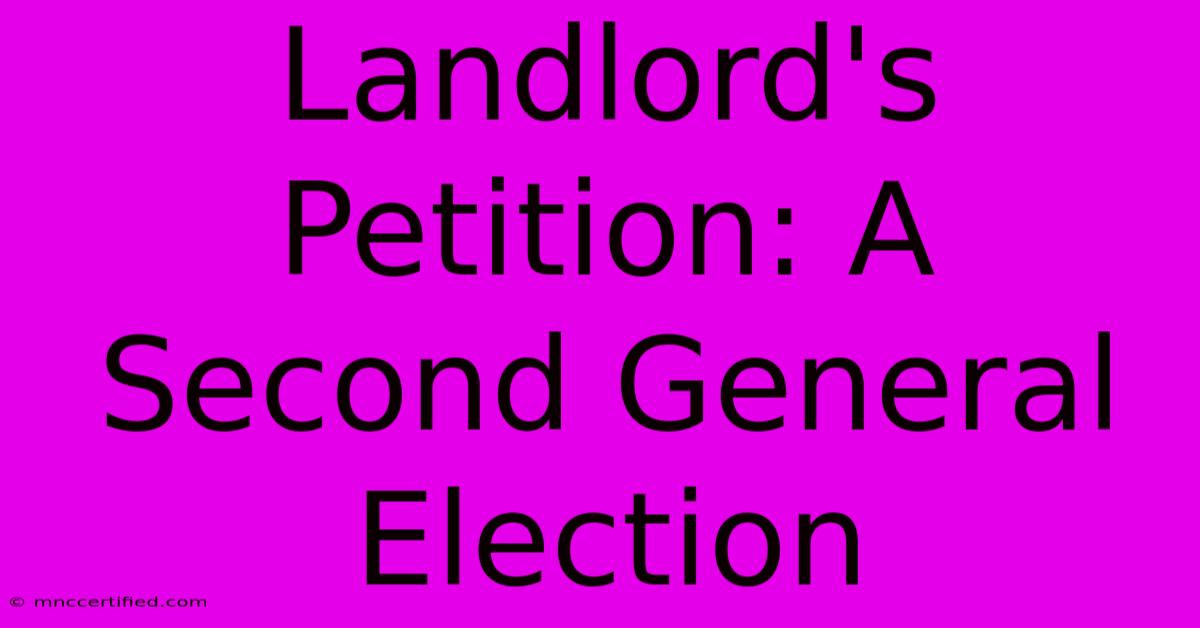Landlord's Petition: A Second General Election

Table of Contents
Landlord's Petition: A Second General Election - Understanding the Implications
A landlord's petition triggering a second general election is an unusual, albeit constitutionally possible, scenario. This article delves into the potential circumstances leading to such an event, its implications, and the legal framework governing it. We'll explore the key factors and offer a comprehensive overview for readers seeking to understand this complex political eventuality.
What Constitutes a "Landlord's Petition"?
The term "landlord's petition" isn't a legally defined term in most parliamentary systems. It's a colloquialism referring to a scenario where a significant issue related to land ownership, property rights, or landlord-tenant disputes becomes a major catalyst for political unrest, potentially leading to demands for a new election. This could arise from various situations:
- Widespread Evictions and Housing Crisis: A massive wave of evictions due to policy changes or economic hardship could spark public outrage, prompting calls for a change in government. This could be fueled by perceived inaction or inadequate responses from the ruling party.
- Land Reform Legislation: Controversial land reform legislation, perceived as unfair or detrimental to landlords, could generate significant opposition and pressure for a new election.
- Corruption Allegations in the Property Sector: If allegations of corruption involving high-profile landlords or government officials linked to the property market surface, it could damage public trust and lead to demands for accountability through a fresh mandate.
The Link Between Public Outrage and Election Calls
It's crucial to understand that a "landlord's petition" doesn't directly trigger an election. Instead, it represents a potent source of public dissatisfaction that can be exploited by opposition parties to pressure the government. The catalyst is the widespread public anger, not a formal petition from landlords themselves. This anger translates into:
- Decreased Public Support: Negative sentiment towards the government, fuelled by landlord-related issues, leads to declining poll numbers.
- Increased Protest Activity: Public demonstrations and civil unrest become more frequent and intense.
- Political Pressure: Opposition parties leverage public discontent to demand the government's resignation or call for a snap election.
Legal Framework and Constitutional Procedures
The specific legal and constitutional mechanisms for triggering a second general election vary widely depending on the country's political system. Some common methods include:
- Vote of No Confidence: If the government loses a vote of no confidence in parliament, it typically leads to its resignation and a subsequent general election. Public anger related to landlord issues could contribute to a vote of no confidence.
- Government Resignation: The ruling party might choose to resign in the face of overwhelming public pressure and declining support.
- Dissolution of Parliament: The head of state (e.g., monarch or president) may dissolve parliament at the government's request or in response to a prolonged political crisis.
The Implications of a Second General Election
A second general election triggered by landlord-related issues would have several significant implications:
- Political Instability: It signals a deep-seated crisis of confidence in the government's ability to address crucial social and economic issues.
- Policy Uncertainty: The election process creates uncertainty, potentially delaying or disrupting policies related to housing, land reform, and economic development.
- Economic Impact: Uncertainty can negatively impact investor confidence and economic growth.
Conclusion: Understanding the Complexities
While a "landlord's petition" is not a formal legal mechanism, the underlying issues – public anger regarding property rights, housing affordability, and governance – can have profound political consequences. Understanding the potential pathways from public discontent to a second general election is crucial for citizens, policymakers, and political analysts alike. The specific circumstances and political context are paramount in determining the likelihood and impact of such an event. Further research into the specific legal framework of your region is advised for a deeper understanding.

Thank you for visiting our website wich cover about Landlord's Petition: A Second General Election. We hope the information provided has been useful to you. Feel free to contact us if you have any questions or need further assistance. See you next time and dont miss to bookmark.
Featured Posts
-
Aberdeen Fc Cancels Fan Zone Drinks
Nov 27, 2024
-
Fatal Dhl Crash One Dead In Lithuania
Nov 27, 2024
-
Arsenal Champions League Contenders
Nov 27, 2024
-
Richard Coles Emotional I M A Celebrity Journey
Nov 27, 2024
-
Uk Diplomat Expelled Russias Accusation
Nov 27, 2024